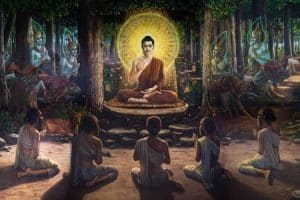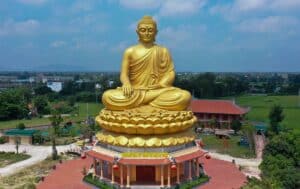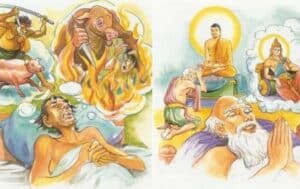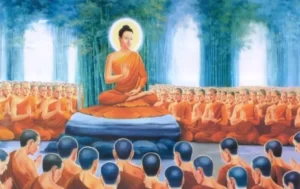Whenever we chanting sutras and remember the Buddha’s teachings, that’s when we recite the Dharma. During the period of chanting, the disturbing thoughts, bad thoughts, and evil thoughts were subdued, so they did not arise; due to being subdued, it weakens.
LotusBuddhas.com would like to send to readers an interview with the late Venerable Thich Tri Tinh – Chairman of the Executive Council of the Vietnam Buddhist Sangha. A great translator of Mahayana sutras. The teachings of the late Great Elder Most Venerable Thich Tri Tinh below have great meaning for those who chant and maintain the sutras to open their minds and penetrate the scriptures.
1. Some people use the word reading sutras, some people use the word chanting sutras. What is the meaning of these two terms?
We should understand “chanting” is to learn by heart, when going to the main hall, wear robes and light incense to worship the Buddha, have a bell with a muzzle, open the sutra and consider it to be chanting.
In fact, it’s not chanting, it’s just reading. To chant is to recite the sutras by heart. Remember that well! Once we have memorized it, we will have great benefits when we recite it. Not only when wearing robes and robes on the Buddha’s temple, but also while walking, standing, lying down, sometimes the sutras that we have memorized will arise in our mind.
Just like people in the world memorize their favorite songs, when they walk or lie down, they often utter a few sentences softly, or in their hearts often think of those songs. In the same way, if we often chant or recite the Buddha’s name, it will bring up the sentence of reciting the Buddha’s name. And if we memorize the sutras, then the sutras often arise, then at that moment we have already chanted the sutras.
2. Master taught that Buddha’s words were precious. So, what benefits do those who chant the sutras?
Whenever we chant sutras and remember the Buddha’s teachings, that’s when we recite the Dharma. During the period of chanting, the disturbing thoughts, bad thoughts, and evil thoughts were subdued, so they did not arise; Because it is subdued, it weakens; when it is weak, when it arises, it also begins to be weak.
Because of weakness, the bad karma also weakens. When the side of sin and karma is weak, the good roots of merit will arise. Those two are like two weighing scales. If one side is heavy, the other side is light. If one side is light, the other is heavy, of course. In other words, in addition to the blessings of reverence for the Buddha’s teachings, those who chant sutras can eliminate bad karma.
3. During his monk’s life, he must have realized many things by reciting Sutras. Could you give me an example of awaken through chanting?
Now I will make this clear to you, because normally few people think about it. While chanting the Vajrayana Sutra, I discovered something that I have long thought about for a long time, I don’t know why, in the sutras, it says that a Sotāpatti completely eradicates afflictive views, and afflictive thoughts will be eliminated at the latest in seven lifetimes then become an Arahant. The Sotāpatti does not have an eighth life, only the seventh life is final. The sutras say it clearly, but don’t say anything about cultivation.
I often think about it all the time, but I can’t figure it out. Until he chanted the Vajra Sutra, the Buddha asked Subhuti: Does the Sotāpatti call himself Sotāpatti? Subhuti replied no. Because Sotāpatti is called stream-entry. Say enter but no place to enter. It does not enter into form, sound, smell, taste, touch, or dharma, so it is called Sotāpatti. Right there I suddenly broke the thing that spent countless hours thinking about why the Sotāpatti did not have the eighth life, within seven lifetimes ended up completely and attained Arahantship.
That is, the Sotāpatti, after seeing then his mind is no longer dominated by form, sound, smell, taste, touch, and dharmas. Because it is not dominated, the citta has no opportunity to arise. Because it does not arise, it gradually weakens. Due to weak wear, it stops time and time again. When a part ends, it becomes Sakaḍāgāmi. After adding more parts, it becomes Anāgāmin. Stop further until you have finished all of them, you will become an Arahant. It ends part by part, over and over again.
In the same way, every day, if we recite the Buddha’s name and chant sutras, then our afflictions and bad karma will not arise. It doesn’t arise during the time we have reciting the Buddha’s name, chanting sutras, but it doesn’t always arise. But if it did, it would weaken. When it weakens, the good develop, it is called a cultivation. When karmic afflictions are subdued, good roots of merit arise. Until a certain point in time when colors, sounds, smells, tastes, touches, and dharmas no longer dominate one’s mind, it is success.
But I don’t know when, because the mortal race of we in Samsara is very heavy, the karmic afflictions are very heavy. But if every day we have a method to eliminate it, it will weaken. Otherwise, if we are dominated by form, sound, smell, taste, touch, and dharma, every day it is not only not weak but also stronger, we will sink deeper into the Samsara. The above is just an example. If the brothers chanted sutras every day, it would reveal many beneficial things. Therefore, I advise you to diligently chant sutras to penetrate the Buddha’s mind.
4. In Pagodas Vietnam, when chanting sutras then also recite Buddha’s name. Could you please explain the method of reciting the Buddha’s name in chanting?
I make it clear to you that chanting and reciting the Buddha’s name properly is true cultivation. When reciting Buddha’s name, it is not predestined for other things. Not dependent on form, sound, smell, taste, touch, and dharma. Only the place where the sound of the recitation of Buddha’s name. As the practice grows stronger and stronger in the practice of reciting the Buddha’s name, the thoughts of form, sound, smell, taste, touch, and other dharmas become less and less each day, because during that period of time it cannot arise, it must be reduced. But if the time to recite Buddha’s name is more and more, of course, every day, we will gradually progress.
Just as a meditator keeps his mind from giving rise to hope, of course so that his inner mind is not influenced by form, sound, smell, taste, touch, and dharma. It does not dominate, the karmic afflictions do not arise from nowhere. If the karmic afflictions do not arise, they will gradually lighten, until at some point like the veil is torn and dissolved, the light from within comes out, called enlightenment. The two paths to practice though Zen or Pure are the same, not different.
5. True cultivation is not letting the mind stick to the external environment?
Right! Every day we are dominated by colors, sounds, smells, tastes, touches, and dharmas, so we cannot cultivate. When colors, sounds, smells, tastes, touches, and dharmas can’t control our inner mind, that’s when we cultivate. Remember that well! Don’t have to wait until it’s time to put on a robe and put it on the main hall. Wearing robes and robes on the main hall, worshiping the Buddha, but being influenced by external objects of color, sound, scent, taste, touch, and Dharma is not yet a practice.
The Dharma taught by the Buddha is clear to cultivate the mind. The body and speech only help the inner self. That is not to say that the training sessions should not be abandoned. At first, if the strength is still weak, you must rely on the course, the important thing is that you must practice outside the course. Therefore, reciting the Buddha’s name does not matter when walking, standing, lying down, or sitting, if there is always mindfulness, there is cultivation, but if interrupted, there is no cultivation. That is the main point. All other dharmas are the same.
6. In order to penetrate the sutras when chanting, what must the chanter do to achieve it?
To do so, when chanting sutras must memorize the sutras. Not only the courses in the temple must be memorized, but the sutras you like must also be memorized. Whoever can do that, it is not difficult to penetrate the sutras.
7. People who are busy with many jobs do not have time to recite much, how can they understand the sutras?
Busy people can choose important sutras to recite. I just like how to arrange my time in the past. In 1963, when the struggle with Mr. Diem started and in 1964, when I founded the Unified Buddhist Sangha, I was busy with many jobs, so I did not have time to recite the Lotus Sutra every day.
Everyone knows that chanting must be recited all the time or else they can’t forget, so they can’t continue chanting the Lotus Sutra, but only keep the verse of Means as a timetable until now. When we can arrange the time, we can chant more steadily and regularly to understand the sutras thoroughly.
If chanting aloud, it will take more than 2 hours, if chanting silently, it will take about an hour and a half. I’m 94 years old this year, so I can only do the class by silently chanting, but I can’t do it out loud. The reason I say it so carefully so that we know clearly our practice is that there must be daily continuity.
Chanting and reciting the Buddha’s name, in addition to the main purpose of being rebirth Pure Land, also has the effect of subduing karmic afflictions, causing the good roots of merit to be increased. If you practice regularly like this every day, of course, you will gradually reduce the part of the ordinary mortals of birth and death and progress on the path of sage and liberation.
8. Once you understand the sutras, how long does it take to get results?
Even the Buddha had to go through many lifetimes of practice, not the number that we usually calculate. Obviously, the Buddha himself spoke, no one else.
But it’s not normal like us, who can do a little bit of merit and claim to become a Bodhisattva and become a Buddha immediately. In the sutras, it teaches very well about the conduct of the bodhisattvas very clearly. Everyone should try to read it.
In general, getting rid of karmic afflictions to get out of samsara is not an easy thing. But if I practice regularly, I can success. But once there is a step, there is a time to come. Having a one-step step is having a one-step liberation, not waiting for the destination to be liberated.
It’s usually fun to think like that. Because knowing that I take a step every day, I am closer to the shore of liberation each day. Remember carefully that the number of lives is not a few. You don’t have to hear: “The mind means Buddha” and then think that seeing the mind is becoming a Buddha. Because if that’s the case, then I’m far ahead of Shakyamuni Buddha.





